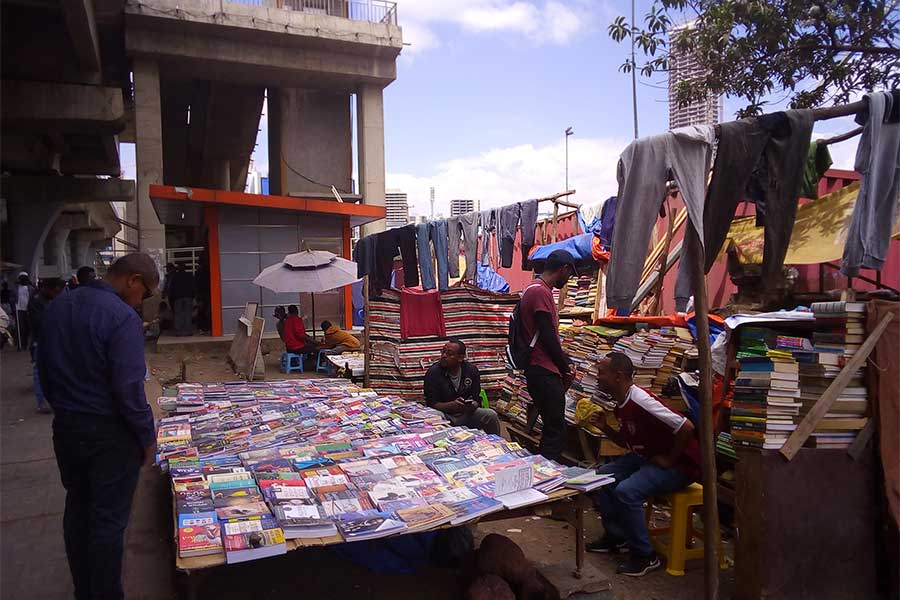
Jun 3 , 2023
By AKSAH ITALO ( FORTUNE STAFF WRITER )
A bill that compels street vendors in Addis Abeba to wear lanyard badges featuring their name, trading location and type of employment has been prepared by the city Trade Bureau.
According to the draft, clothing, electronic gadgets, baked goods, fruits and vegetables, books, non-alcoholic beverages, housing equipment and plastic bags will be the only products allowed to be sold on the streets. The vendors must be above 18 and present evidence of unemployment from the Wereda office.
The absence of a legal framework for the line of business has raised issues with taxation and road congestion, according to Engidaw Tegegn, research & promotion team leader at the Bureau.
"A proper regulation has become necessary," he said.
Traffic congestion has become an impediment to transportation, with close to 54pc movement accounting for pedestrians while 31pc is covered by public transport. A study prepared by the Addis Abeba Transport Bureau over the past two months unveils that street trading has contributed immensely to current low motorisation rates and frequent congestion.
The sidewalks hovered by traders result in high accident rates as they are not integrated with transport network routes, said Mohammed Hussein, advisor at the Bureau. He added that the limited institutional capacity and uncoordinated efforts of infrastructure, transport network, employment and population centres have played a part.
Nearly 212 deaths due to traffic accidents have been recorded in the past six months. The Megenagna, Mexico and Ayer Tena areas are the most prominent places where street trading has become prevalent, according to a Senior Expert at the Addis Ababa Traffic Management Agency (AATMA), Dereje Worku.
"Afternoons are peak hours when lanes become too crowded," he told Fortune.
An estimated 120,000 informal traders are trying to make ends meet on the streets of the capital. The low capital investment requirement amidst inflation and economic upheaval has many joining the line of work.
Yared Tegegn, who sells t-shirts around the Megenagna area, recalls a near-death experience after running into a heavy white bus. He gets around 200 Br daily after selling four t-shirts.
"It's full of uncertainties," he said.
It is not unusual to see law enforcement officers chasing after these street vendors to confiscate the merchandise and levy up to a 300,000 Br penalty. The officers believe the daunting task of enforcing the commercial law has become impossible with upcoming vendors emerging on the streets on a daily basis.
Tamrat Tesfaye, a law enforcement officer for more than 10 years, looks out for trespassers at the Megenagna streets. He observes a rising number of street vendors over the years, making it difficult to maintain proper control as they return to the place after a few hours.
"The back and forth is daunting," he said.
The bill is pending approval from the Council of Ministers. Legal experts applaud the move citing that anyone above the age of 18 should be accountable to the law and pay taxes.
Abinet Solomon, a commercial lawyer, advocates the proper regulation of street traders rather than prohibiting their existence. The expert believes every trader should own a business licence and be regulated to sustain accountability.
He recommends legally organizing the traders to provide a long-term solution rather than temporary reliefs such as the Sunday markets.
PUBLISHED ON
Jun 03,2023 [ VOL
24 , NO
1205]

Radar | Sep 02,2023

In-Picture | Feb 22,2020

Viewpoints | May 11,2023

Radar | Apr 03,2023

Fortune News | Jun 04,2022

Dec 22 , 2024 . By TIZITA SHEWAFERAW
Charged with transforming colossal state-owned enterprises into modern and competitiv...

Aug 18 , 2024 . By AKSAH ITALO
Although predictable Yonas Zerihun's job in the ride-hailing service is not immune to...

Jul 28 , 2024 . By TIZITA SHEWAFERAW
Unhabitual, perhaps too many, Samuel Gebreyohannes, 38, used to occasionally enjoy a couple of beers at breakfast. However, he recently swit...

Jul 13 , 2024 . By AKSAH ITALO
Investors who rely on tractors, trucks, and field vehicles for commuting, transporting commodities, and f...

Jun 28 , 2025
Meseret Damtie, the assertive auditor general, has never been shy about naming names...

Jun 21 , 2025
A well-worn adage says, “Budget is not destiny, but it is direction.” Examining t...

Jun 14 , 2025
Yet again, the Horn of Africa is bracing for trouble. A region already frayed by wars...

Jun 7 , 2025
Few promises shine brighter in Addis Abeba than the pledge of a roof for every family...